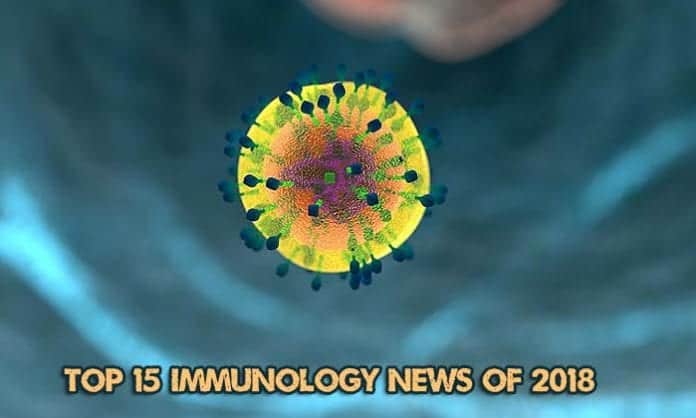
Top Immunology News in 2018: Our immune system helps us battle pathogens and prevent illnesses. However, sometimes our body fails us.
At present, both medical professionals and researchers realize – to fight diseases, we need to learn from them. Moreover, this new approach has been proven successful – as the new crop of immunology-related discoveries in 2018 demonstrates.
Table of Contents
- Top Immunology News & Discoveries in 2018
- Sending lymphocytes after cancer mutations
- Blocking IL-5 helps treat asthma
- Super – antibodies killing super variable viruses
- Neutrophils give a boost to immunotherapy
- Using viral vectors against a lethal flu virus
- Vaccines against human papilloma virus are more accessible now
- Antibodies against HIV found
- Proteomic help understand antiviral immunity
- A new role for NKT cells
- Nanoparticles against cancer
- Modulating the immune system through the skin
- Searching for weapons against herpesvirus
- The new HPV vaccine prevents infections in young men
- Thymosin alpha 1 as an important biomarker
- Peptide vaccines may be safer than traditional ones
Top Immunology News & Discoveries in 2018
Sending lymphocytes after cancer mutations
 Lymphocytes that specifically target mutated cancer proteins were shown to be effective breast cancer types previously resistant to treatment.
Lymphocytes that specifically target mutated cancer proteins were shown to be effective breast cancer types previously resistant to treatment.
- The new treatment was tested in a patient with metastatic breast cancer;
- The patient had undergone an adoptive transfer of autologous lymphocytes specific mutated versions of the following proteins: SLC3A2, KIAA0368, CADPS2 and CTSB;
- The patient was also given IL-2 (Interleukin-2) and checkpoint blockade;
As a result, the patient went into a regression of metastatic breast cancer which has already lasted for more than 22 months.
![]()
Blocking IL-5 helps treat asthma
 It was proposed that monoclonal antibodies to IL-5 (Interleukin-5), an eosinophil regulator, may be beneficial in asthma treatment.
It was proposed that monoclonal antibodies to IL-5 (Interleukin-5), an eosinophil regulator, may be beneficial in asthma treatment.
- Anti-IL-5 antibodies reduced the symptoms of allergic inflammation in mice;
- The Anti-il-5 vaccine was effective against eosinophil-driven skin disease in horses;
There is strong evidence that such a vaccine could be helpful in asthma treatment in humans.
![]()
Super – antibodies killing super variable viruses
 Broadly cross-reactive monoclonal antibodies or “super-antibodies” offer novel ways of treatment of infections.
Broadly cross-reactive monoclonal antibodies or “super-antibodies” offer novel ways of treatment of infections.
- Super antibodies are either a result of broad screening for donors or antibody engineering;
- Super antibodies can be used in preparing vaccines against viral infections;
- Super antibodies can also be effective in antiviral treatment;
It is expected that this class of antibodies could be especially effective against highly variable viruses, such as influenza, because of their broad range of cross-reactivity.
![]()
Neutrophils give a boost to immunotherapy
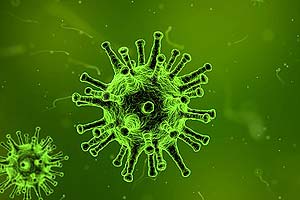 The influence of neutrophils on the effects of antibody-mediated immunotherapy was studied in mice.
The influence of neutrophils on the effects of antibody-mediated immunotherapy was studied in mice.
- It was shown that neutrophils had a limited effect on the control of viral replication and propagation driven by NKT (Natural Killer T) cells;
- During passive immunotherapy, neutrophils induced a potent humoral response against viruses;
- Presence of active neutrophils contributed to the development of immune protection;
It was concluded that supporting neutrophil function in immunotherapy would help to establish lasting protection against viral infections.
Neutrophils are essential for induction of vaccine-like effects by antiviral monoclonal antibody immunotherapies”. Accessed March 28, 2019. Link.
![]()
 A novel treatment against lethal influenza infection was tested in mice.
A novel treatment against lethal influenza infection was tested in mice.
- A viral vector was created that contained genes for antibodies against influenza virus hemagglutinin;
- Viral vectors were given to mice through hydrodynamic injection;
- Vectors led to the expression of neutralizing antibodies both in serum and mucosal tissues of mice;
- A single injection was sufficient to protect mice against lethal flu infection.
The study shows that passive immune therapy should be tested for influenza treatment in humans.
![]()
Vaccines against human papilloma virus are more accessible now
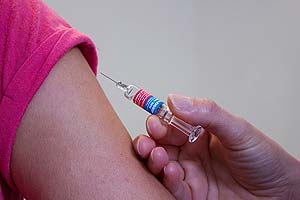 Several new types of vaccines against Human Papiloma Virus (HPV) infection were developed. They are cheaper and more effective.
Several new types of vaccines against Human Papiloma Virus (HPV) infection were developed. They are cheaper and more effective.
- Protein-based subunit vaccine, SPG-00101, was effective in the treatment of HPV-induced lesions in women;
- Intranasal recombinant vaccines were shown to induce high titers of anti-HPV antibodies;
- A recombinant vaccine that provides protection both against measles and HPV was developed.
There are many more novel approaches that allow both protection against HPV infection and treatment of HPV-induced cervical cancers.
![]()
Antibodies against HIV found
 The efficacy of broadly neutralizing monoclonal antibodies against human immunodeficiency viruses (HIV) infection was evaluated during a pre-clinical study in humans.
The efficacy of broadly neutralizing monoclonal antibodies against human immunodeficiency viruses (HIV) infection was evaluated during a pre-clinical study in humans.
- Antibodies were tested in healthy humans and HIV-infected patients;
- The antibodies lead to a decrease in viral load;
- For patients that interrupted antiretroviral therapy, the rebound of the infection was delayed;
- Strains resistant to antibodies have emerged, so their potential is limited;
Though HIV viruses can develop resistance to antibodies used, there is a room for improvement in this type of treatment through various manipulation approaches.
![]()
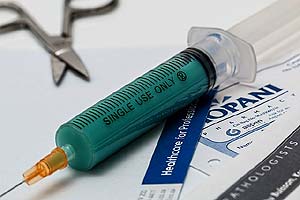 Antiviral immunity is a complex process involving both branches of the adaptive immune system. Proteomics allows gaining new insights into this process.
Antiviral immunity is a complex process involving both branches of the adaptive immune system. Proteomics allows gaining new insights into this process.
- Proteomics allows finding new viral antigens;
- Proteomics methods allow the scientist to track the presentation of antigens to T and B cells;
In short, proteomics allows finding new vaccine candidates and helps in the treatment and monitoring of viral infections.
![]()
A new role for NKT cells
 It was found that Natural Killer T (NKT) cells are crucial for mounting an antiviral immune response.
It was found that Natural Killer T (NKT) cells are crucial for mounting an antiviral immune response.
- NKT is critical for the induction of B cells in response to viral infections.
- NKT cells produce around 70% of IL-4 at the early stage of infection;
- Increase in NKT cells activity and IL-4 production correlates with an increase in neutralizing antibodies in macaques infected with Zika virus.
It was concluded that NKT cells are an essential branch that links innate immunity with adaptive immune response in viral infections.
![]()
Nanoparticles against cancer
 A novel application of nanoparticles in cancer therapy was proposed.
A novel application of nanoparticles in cancer therapy was proposed.
- Nanoparticles can safely encapsulate other molecules and serve as drug delivery systems;
- Their surfaces can contain antibodies that will enable targeted delivery to specific cell types;
- Nanoparticles can deliver antigens directly to T-cells, priming them against cancer cells;
- They can also be used to boost the immune reaction against cancer by delivering cytokine cocktails.
Nanoparticles have vast potential in cancer treatment and may become a cheaper, safer and more effective treatment option.
![]()
Modulating the immune system through the skin
 The skin has become a convenient target for delivering immunomodulatory and immunotherapeutic agents for the treatment of autoimmune diseases, infections, and cancer.
The skin has become a convenient target for delivering immunomodulatory and immunotherapeutic agents for the treatment of autoimmune diseases, infections, and cancer.
- Skin contains resident immune cells, which can become targets for promoting immune tolerance or priming an immune response;
- Skin is the primary route for vaccination and inducing immune tolerance;
- Nanotechnology allows targeted and safe delivery of drugs, immunomodulators, and antigens.
With the advent of engineered antibodies and new nano drugs, transdermal immune modulation becomes a preferable route for many different types of treatment.
![]()
Searching for weapons against herpesvirus
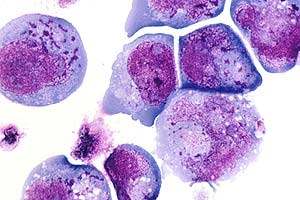 Reactivation of human herpesvirus 6 (HHV6) is a leading cause of potentially lethal consequences in transplant recipients. In order to prevent them, it is necessary to understand how the immune response is mounted in human bodies.
Reactivation of human herpesvirus 6 (HHV6) is a leading cause of potentially lethal consequences in transplant recipients. In order to prevent them, it is necessary to understand how the immune response is mounted in human bodies.
- A novel high throughput method was developed that allows finding T-cells epitopes to large genome viruses;
- This approach is now used to study responses of T cell to HHV6;
Studying the intricacies of T cell response to HHV6 will help in treatment against this infection in immunocompromised patients.
![]()
The new HPV vaccine prevents infections in young men
 A long-term study of the efficacy of newly developed quadrivalent HPV vaccine in young men was undertaken.
A long-term study of the efficacy of newly developed quadrivalent HPV vaccine in young men was undertaken.
- Young men between 16-26 years old were given 3 doses of HPV vaccine;
- 917 participants in total were followed for approximately 11 ½ years;
- The men were evaluated for the presence of genital lesions or anal cancer post vaccination.
- No new cases of lesions, neoplasias or anal cancers were reported in the studied population.
The HPV vaccine provides durable protection and mitigates the risk of anal cancer development.
![]()
Thymosin alpha 1 as an important biomarker
 Thymosin alpha 1 (Ta1) levels in the serum were evaluated in some different conditions.
Thymosin alpha 1 (Ta1) levels in the serum were evaluated in some different conditions.
- Ta1 is an indicator of immune dysregulation;
- An increase in Ta1 levels is observed in hepatitis B, multiple sclerosis and sepsis;
- Cystic fibrosis is associated with lower levels of Ta1;
The variability of Ta1 levels can be an indicator of the patient’s condition and also can be used for proper treatment prescription.
![]()
Peptide vaccines may be safer than traditional ones
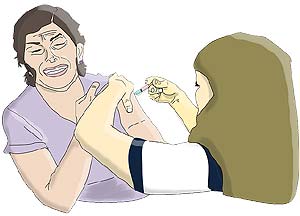 Conventional vaccines against viral infections contain components that are immunogenic but can cause autoimmune reactions. It was proposed to use peptide vaccines instead.
Conventional vaccines against viral infections contain components that are immunogenic but can cause autoimmune reactions. It was proposed to use peptide vaccines instead.
- Using peptide vaccines means avoiding adjuvants that can potentially trigger inflammatory responses;
- Peptide vaccines do not get contaminated with non-viral proteins of cellular origin;
- Potential vaccine candidates can be selected both from capside proteins or non-structural viral peptides;
- The vaccines should activate both CD4 and cytotoxic CD8 T cells.
Peptide vaccines may be easier to manufacture using modern methods and would be safer to use in the long run.
![]()
As the old saying goes, an ounce of prevention is worth more than a pound of cures. As we understand better how our immune system works, we can develop better vaccines, drugs and immune therapy agents to prevent debilitating conditions.
![]()

















